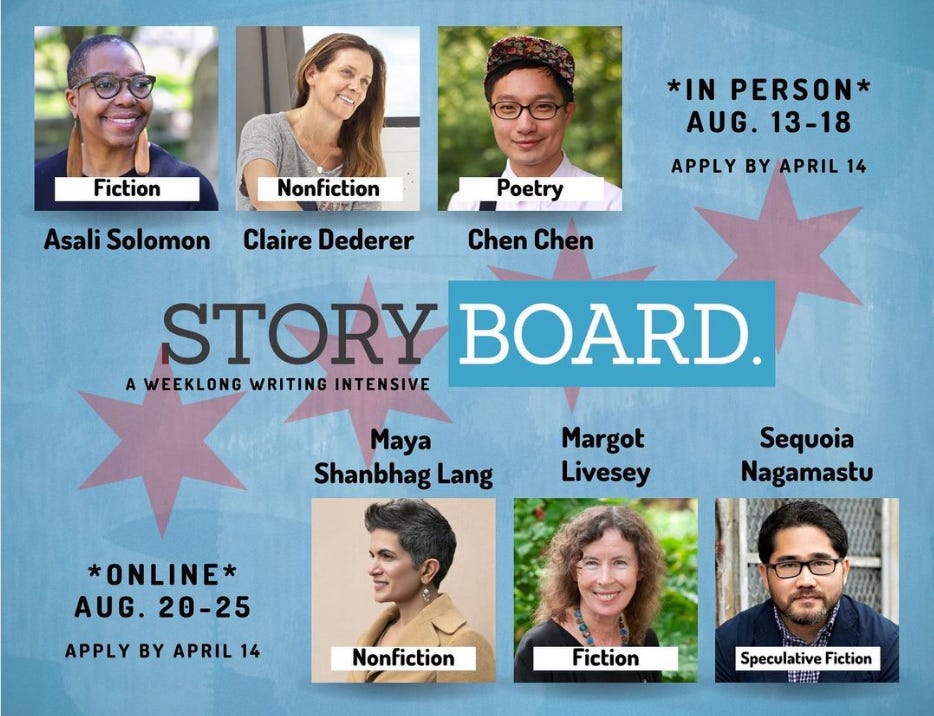The (Springtime) Writer Edition! #4
Craft stuff, things to do, prompts, all about character, and a cranky rant
It’s actually warm out here in Chicago, which means I feel kind of alive. And I feel like writing! I write best outside, as long as I can see my computer screen.
Question: Why on EARTH have they not made a laptop where the screen doesn’t blindingly reflect the sun? This technology definitely exists for e-readers…
Anyway, here’s some stuff for the writers, and for the readers who tolerate us:
Please Stop Calling Setting “A Character”
I wrote an essay for LitHub about how unhelpful it is to call setting a character. (As in, “Why, the setting was so alive, it was almost a character!” or “The psych ward itself was practically a character!” or “Sheboygan was so well-painted it was nearly a character!”)

From the essay: Setting is, in my view, the most underutilized tool in fiction. And to subsume its virtues under another category is to neglect its actual horsepower. Please allow me to convince you to consider setting on its own terms.
Five Things I’ve Learned About Getting Unstuck
I’m teaching an online class on Sunday, May 21st that’s all about how to get yourself unstuck in any creative project (particularly writing, but really anything).
You cannot actually click that photo to make my invite video play, but you CAN click here… It’ll be available as a recording, too.
From the Feedback Files…
I’ve been sharing pieces of advice from my giant cut-and-paste file of student feedback (the advice I give so often it’s worth saving). Here are four different paragraphs on character physicality and character differentiation, for writers struggling with different aspects of it:
For the writer whose characters lack physicality:
I couldn’t tell you much about what most people look like, how old they are, or their mannerisms. Your cast is quite large—and that will only work if you give us easy ways to remember each character, and enough to latch onto. Charles Dickens overdid this, but do look to him for an example. He was releasing very long books in serial, and he needed his readers to remember a character months and hundreds of pages later. So he’d name a character, like, Mortimer Fishwhistle and then give him a very fishy face and a giant goiter and a Scottish accent; and whenever Mortimer Fishwhistler reappears he manages to remind us of all those details. Obviously don’t go that far, but do give us physical characteristics that MATTER and come into play in the story; for instance, an elderly character might have trouble getting around the amusement park, or people might make fun of a character’s thick southern accent…
For the writer whose characters blur together:
It’s quite hard right now to tell your secondary characters apart. A few things to keep in mind, aside from fleshing out their backstories: 1) We tend to remember people we’re introduced to in a memorable way (both on the page and in real life!)… Take time to really spotlight someone important when they first appear. 2) Especially because everyone’s new to your main character, she can spend quite a lot of mental energy on telling them apart herself, and on noticing their physicality, their accents, their clothing, their movements and idiosyncrasies. 3) You can either directly or indirectly remind us of which person is which when they reappear (i.e., either by saying “Maggie, the one with the red hair” or “Maggie’s red hair was a mess today”). 4) You might consider finding names that are as different from each other as feels reasonable for the era. I found Rita and Ruth particularly confusing.
For the writer who over-describes characters:
You give us a huge laundry-list of physical description on each character as they’re introduced. We really only need one or two details on each character (a big guy with a cat tattoo, a small girl with tan shoulders, etc.). In fact, we won’t be able to remember more than that. But describing people in detail before we know who they are or why we should care about them isn’t going to work. If I spent half an hour describing, in great physical detail, someone you’d never met, you’d be bored out of your mind. If I said I was about to describe the person you would marry and then spent half an hour on it, you’d be interested. It’s a matter of context and timing. (And, since we aren’t going to marry these characters, careful selection of detail.)
For the writer who’s hitting character notes too hard:
Many of your characters feel quite single-note, as if you’re pushing too hard on certain characteristics so we can’t miss who they are. (For instance, you mention Bret looking at his phone many, many times!) This is often the result of insecurity; you really want this person to come across to us and are worried they won’t. The thing is, real people are wildly contradictory, contain multitudes, etc.—and so characters won’t seem real and three-dimensional until they contain a great deal of nuance and some contradiction.
Two Conferences You Should Apply To!
StoryBoard, StoryStudio Chicago’s August workshop intensive:
This is our big application-based summer workshop; you’ll be in a selective class of 10 students, either in person in Chicago (the week of August 13th) or online (the week of August 20th). In either case, you’ll get to hear craft talks from all six authors.
This is our fourth year, and the program has been an enormous success. Some cohorts from previous summers still meet virtually… I put the faculty for this together myself, so these are all people I know to be amazing (and wonderfully kind) teachers as well as brilliant writers.
Applications are open till Friday, April 14th… Find out more here!
The Longleaf Writers Conference in Florida
Applications are still open for this conference in Seaside, FL in mid-May. I’ve been twice before and am going this year as a visitor (I’ll give one lecture and hang out a lot). It’s (in part) LITERALLY on the beach, and ridiculously fun.
Find out more here…
OMG It’s Meg Wolitzer!
This Thursday (4/13) I’ll be interviewing the brilliant Meg Wolitzer onstage in Chicago, as part of a new collaboration between the Newberry Library and StoryStudio Chicago. This is more Inside the Actor’s Studio than book tour, more This is Your Life than literary reading.
You can join us in person or online; and a few weeks after the fact, the conversation will be up on the Newberry’s YouTube channel.
A Writing Prompt:
Take some time to remember the worst kid in the neighborhood where you grew up. Write about that person suddenly becoming incredibly famous and beloved, from the point of view of someone like you.









On the prompt. It was the short, loud, bully. Like all short, loud bullies he responded, and relented, to force. He later became the coxswain on the Olympic Rowing team which President Carter prohibited from going to Moscow.He remained short.
On character notes, I just have to share the perfect description of his mother by Preston Sturges:
"My mother was in no sense a liar, nor even intentionally unacquainted with the truth…as she knew it. She was, however, endowed with such a rich and powerful imagination that anything she had said three times, she believed fervently. Often, twice was enough."